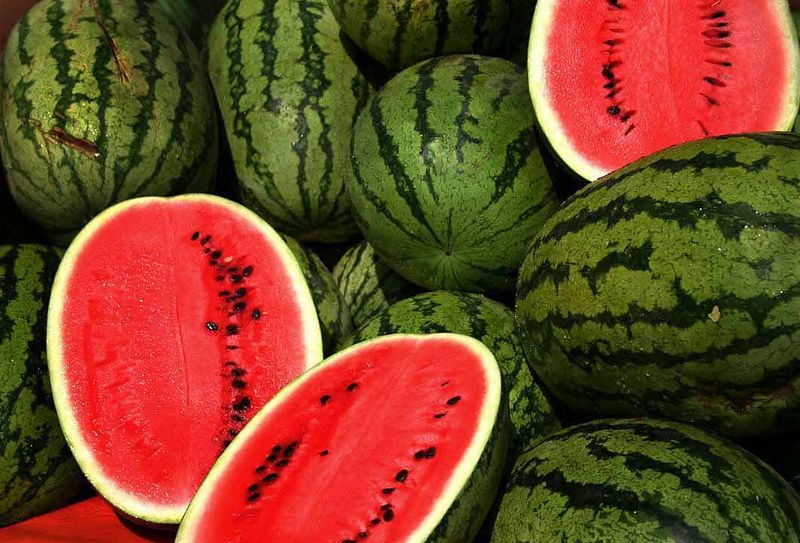
Kashmir Gears Up for Ramazan: Early Arrival of Watermelons Raises Concerns Over Ripeness
-
Dates, Watermelons Flood Kashmir Markets Ahead Of Ramazan
-
Expert warns against consuming early-ripened fruits citing health concerns
Srinagar: Dates and watermelons have flooded the markets of Kashmir as the Muslims of the valley are likely to start month-long dawn-to-dusk fasts of Ramazan from Tuesday.
Shops and handcart vendors have prominently displayed the dates and watermelons as their sales are expected to pick up with the start of Ramazan expected from tomorrow.
The Muslims will start the fasting after sighting of crescent -? most likely tonight. They will wake up every night for two hours before dawn to have meals and abstain from eating and drinking for the entire day. The fast is broken just after sunset, with dates and watermelons being the preferred food to break the fast with.
However, the dealers are surprised that there is not much demand for these products yet. “Usually, people would start buying dates at least one week before the fasting month begins but this year the sales are not that good,” Abdul Rashid, a wholesale supplier of dates, said.
The sale of watermelon has also been on the lower side as some doctors have warned against consuming the fruit that has been artificially ripened to meet the Ramazan demand. “This is not the season for watermelons. People should avoid this fruit as growth hormones and ripening agents are used indiscriminately for faster growth. These chemicals can cause cancer among humans,” Dr Mudasir Ahmad said.
Meanwhile, Experts have strongly advised against consuming early-ripened fruits, especially watermelon, due to potential adverse health effects. They said consumers can distinguish artificially ripened fruits by their taste, which often lacks the sweetness found in mature fruits.
Dr Mehraj D. Shah, Head of the Research Centre for Residue and Quality Analysis at SKUAST Kashmir, said, “Watermelon is not our main crop. Usually, people use ethylene and other chemicals for the quick ripening of the fruit.
Any chemical used for earlier ripening isn’t good for health, whichever fruit it may be.” He explained, “The maximum permissible level of pesticides is a limit for exported fruits and vegetables that most countries adhere to. Any consignment that exceeds such limits is rejected upon testing. However, such testing isn’t conducted for domestic purposes, and these rules aren’t applied for local use. It should be implemented here too.” Dr Shah said every pesticide, once sprayed, has a waiting period before consumption.
“However, there are no such criteria in Kashmir or any other part of the country. There is a need for testing procedures for fruits and vegetables regarding forced ripening or natural ripening,” he said. Fruits arriving early in the market are either the result of chemical use or the injection of chemicals after the fruit is set to be transported, which is very unhealthy, the doctor said, adding that forced ripening fruits lack natural taste and their Total Soluble Sugars (TSS), which determine maturity index, couldn’t be seen in such fruits.
The expert said that testing would determine the maturity of the fruit as every pesticide has adverse effects. During Ramadan, to manage water levels in the body, there are other options than watermelon, Dr Shah added. Chairman of Kashmir Valley Fruit Growers Union, Bashir Ahmad Basher told KNO that they have no idea about artificially ripened fruits. He said the concerned authorities should test the fruits. According to Bashir, Kashmir receives watermelon even in winter, but people usually consume it during Ramadan. “We can’t determine whether the fruit is ripened artificially or mature. It can be scientifically checked by authorities only,” he said

